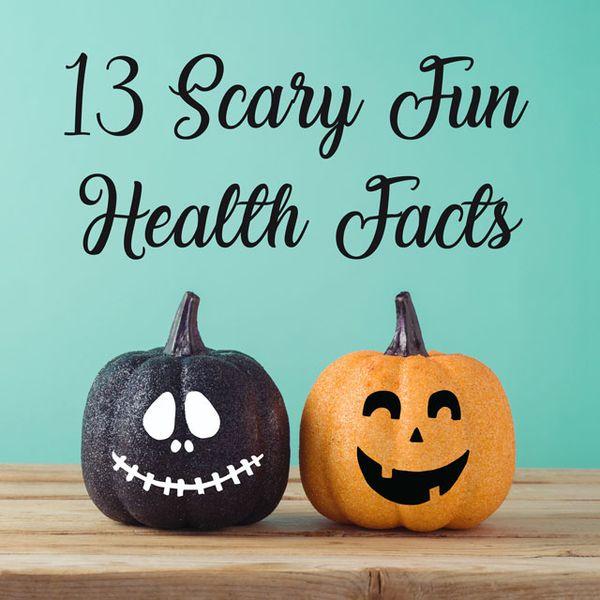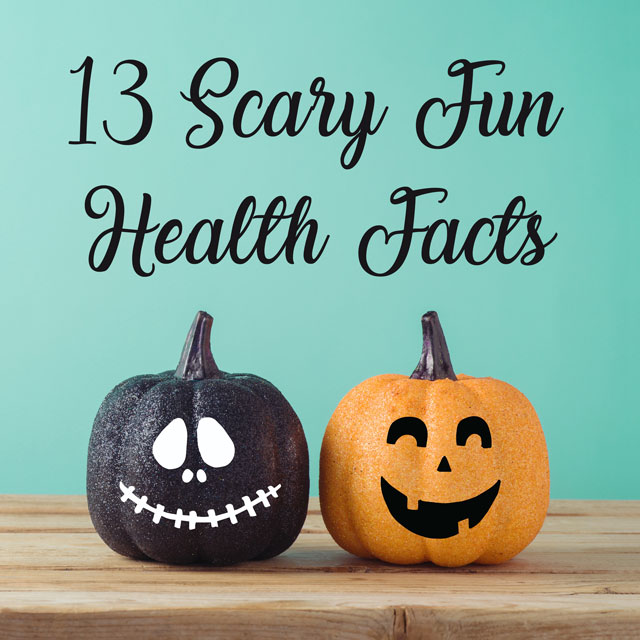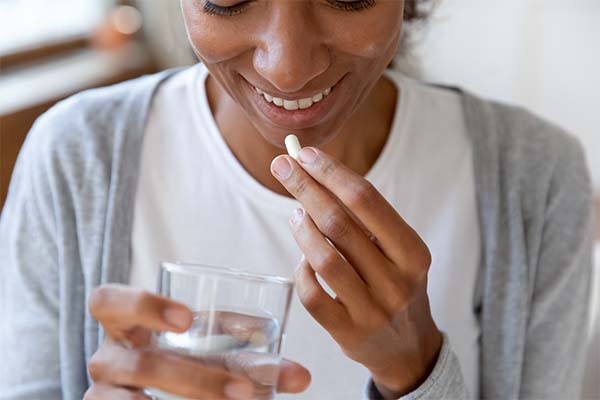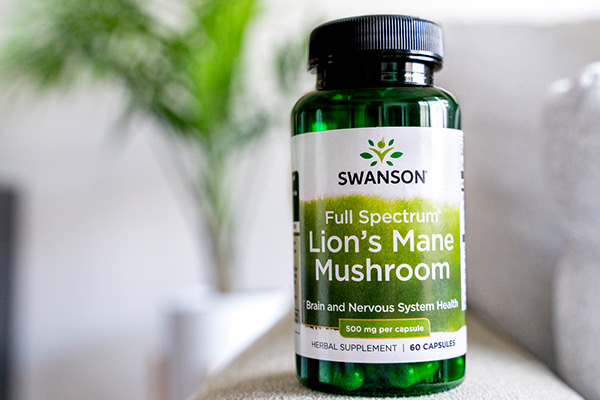13 Scary, But Fun, Health Facts
The body and its many amazing functions leave us with no shortage of weird and wacky facts to think about. With that in mind, here are some spooktacular health facts that are both scary and fun!
Whether you’re out to improve your health prowess, impress (or gross out) your family and friends or get a jump start for trivia night, you're sure to find something interesting below
1. You Have Bugs in Your Gut
That's right! But it’s not a bad thing. Tiny microbes in your stomach and digestive tract help you digest food, support immune health and more.1 Some researchers estimate that the average person has 1-2 lbs of bacteria living in their gut at any given time.1
The trick is to make sure the good bacteria outweigh the bad, which you can do with a healthy, balanced diet and by taking a good probiotic supplement and prebiotic fiber. Learn more about probiotics and how they benefit your health in Prebiotics vs. Probiotics vs. Postbiotics.
2. Bacteria Live in Your Mouth, Too
The human mouth naturally contains billions of bacteria, and like your gut there are both "good" and not so helpful types of bacteria living there. The "bad" bacteria can contribute to dental health concerns and plaque formation, but other microbes help keep teeth healthy and some of the good guys even secrete substances that fight off "bad" bacteria.2,3
What can you do to help? Brush your teeth regularly, replace your toothbrush often, and consider a chewable oral probiotic to help maintain microbial balance. Also, drinking green tea may help limit the growth of "bad" oral bacteria.4
3. There’s a Type of Body Fat That Actually Burns Calories
Did you know that not all body fat is created equal? We have both brown fat and white fat in our bodies. White fat is the type you’re probably most familiar with. Researchers once thought that only babies had brown fat, but as it turns out, adults have it too!5
Brown fat doesn’t take up as much space, and it’s used for thermogenesis, the production of heat. When brown fat is burned it creates body heat, burning calories in the process.5 People who have more brown fat tend to have lower body-weights. Research is underway to try and identify how to help the body recruit more brown fat cells.5 So far, researchers think exposing your body to cool temperatures may help, and exercise may play a role too.5
Also, not all dietary fat is bad either. Read Be Fat Fluent: Best Fatty Foods for Your Diet to learn more.
4. Your Body Makes Some of its Own Nutrients
We often read about the essential nutrients your body needs to stay healthy, but do you know why some nutrients are considered "non-essential"? The term is a little misleading in this case. You need nutrients that are considered non-essential, but they're called that because they can be made by the body.
That doesn’t mean you can’t become low in a non-essential nutrient. CoQ10 is a great example. It’s used by every cell in the body, and although the body makes some CoQ10, natural production declines with age, and studies show taking statins can affect CoQ10 production too.6 Experts have linked lower CoQ10 levels with many health concerns. CoQ10 Supplements may help.6
Other examples include amino acids. There are nine amino acids considered essential. You can get these from complete protein sources like whey protein powder. Twelve other amino acids are considered non-essential because your body makes them.7
But just because they aren’t classified as essential doesn’t mean you can’t benefit from getting more. One of those non-essential amino acids, n-acetyl cysteine, is a potent antioxidant that supports liver health, respiratory function and detoxification pathways and it’s needed so the body can replenish glutathione, one of the most important antioxidants.
5. Your Fingernails Grow Faster During the Summer
As cold weather approaches, this may or may not be great news for you depending on your beauty goals. Some research indicates that cold weather slows down nail growth, and your nails also grow faster during the day than at night.9,10
Nails also tend to be more brittle during winter because of cold, dry air and going in and out of the heat, both of which can reduce moisture levels in your nails. Want to help keep your nails strong during winter months? Moisturize daily with a nature-sourced hair and skin oil like certified organic jojoba oil, and supplement with biotin to help strengthen nails.11
6. Some of What You Eat Goes Straight to Your Eyes
The macula is a part of the eye with the highest concentration of photoreceptors. It’s responsible for color perception and sharp vision.12 But the functioning of the macula requires exposing our eyes to a lot of light, including blue light rays from electronic screens. Blue light has shorter, more energetic wavelengths than other types of light, and it can cause eye strain and eye health concerns over time.12
Your body uses substances from the food you eat to help protect your retinas and defend against blue light exposure. In fact, the pigment in your macula is made up of dietary carotenoids, including lutein and zeaxanthin, which help protect photoreceptors.12 If you don’t eat enough of the foods that contain these nutrients, take a supplement like Swanson Vision Defense Formula.
7. You Get a New Skeleton Every 10 Years
How’s this one for a creepy-fun health fact? You probably didn’t learn about this in science class, but it’s true! Your skeleton is replaced every approximately 10 years.13 You don’t just wake up one day with a whole new skeletal system, of course. It happens slowly over time. But this spooky fun-fact highlights the importance of keeping your bones healthy and strong at every stage of life.
There are two key factors in healthy bone regeneration. Your body reabsorbs some of your old bone to help make the new bone, and it builds some new bone from scratch. That means your bone strength and density now will affect your bone health down the road, so make sure you are getting enough of the nutrients your bones need every day to stay healthy, including vitamin D, magnesium, vitamin K and calcium, and get enough daily exercise to support healthy bones too.
8. We Shrink as We Age
Experts say that as early as our 30s, we begin shrinking.14 Between 30 and 70 years of age, men may gradually lose an entire inch of height, and women can lose up to two inches.14 After we turn 80, we may even lose another inch!14
Why do we shrink as we age? Several things are involved including cartilage breakdown, loss of muscle and bone mass.14 We mentioned how to help keep your bones healthy above with daily mineral support and exercise, and you can help support healthy muscles by getting enough complete protein every day. Also, start taking a cartilage-supporting supplement like glucosamine.
9. You’re Taller in the Morning
Do you feel taller when you wake up in the morning than after a long day on your feet? That’s because throughout the course of the day your cartilage can slowly compact, making you 1-2 centimeters shorter at night. When you lay down to sleep at night, the pressure is eased, and your cartilage expands again overnight.15
Sleep is important for more than just a higher vantage point though. You need at least 7-9 hours of sleep each night to support overall wellbeing, including tissue repair, immune health, memory, focus and more.16 Read 10 Tips for Better Sleep Tonight for a guide to better shuteye.
10. The Buddy System is Real: Friends Help Us Live Longer
Is this fact more fun than scary? You be the judge! In-depth research shows that people with healthy relationships may have up to a 50% greater likelihood of survival regardless of age, sex or initial health status.17
Healthier relationships may lead to lower stress levels and better physical and mental health. So, the next time you make fun plans with your bestie, don’t even think about canceling to watch TV reruns. Follow through and keep those relationships healthy!
11. Your Skin Makes Hormones
You probably think of your skin mostly as a protective organ for what’s inside. You aren’t wrong, but there’s more. Your skin is actually an endocrine organ. Hormones that are important for functions throughout the body are produced in the skin and released into circulation—including small amounts of androgens and estrogens, and essential vitamin D.18
It’s a little-known fact that vitamin D is actually a hormone. The body makes vitamin D in a chemical reaction after sunlight exposure, but skin can become less efficient at synthesizing vitamin D as we age, putting older people at a higher risk of becoming deficient in the nutrient.19 We also produce less of it in colder months because we aren’t outside as much, and our skin is usually covered when we do go outside. Take a vitamin D supplement to cover your bases, and read Say Hello to the Sunshine Vitamin to learn more about vitamin D foods and benefits.
12. Five Pounds of Fat is Equal in Size to Three Grapefruits
This may sound like a nonsensical math meme, but it’s true. Five pounds of body fat takes up roughly the same amount of space as three grapefruits, and five pounds of muscle takes up approximately as much space as three tangerines.
If you’re looking to tone up, even five pounds of fat loss can make a big difference—hold up a few grapefruits and see for yourself! This also means you can’t necessarily trust the number on the scale to mark progress if you’re following an exercise plan because you could be replacing lost fat with healthy muscle gain.
13. Your Heart Pumps 2,000 Gallons of Blood a Day
The average person’s heart beats 100,000 times a day to pump 2,000 gallons of blood.20 By the time you’re 70, that’s 2.5 billion heartbeats. Plus, if all the blood vessels in your circulatory system were laid out end-to-end, they’d be 60,000 miles long!20
That’s a lot of ground to cover, and it highlights the importance of keeping this intricate system healthy. To do your part, the American Heart Association recommends getting 150 minutes of exercise per week, which equates to 30 minutes of exercise on five days of the week for overall cardiovascular benefits.21 For tips on how to fit more activity in your day read Move More: How to Move More Each Day, and show your heart some love with Swanson’s top heart care supplements.
Scary but Fun Health Facts
Knowing more about how your body works and what it needs to stay healthy gives you a jump start to be your best self. We hope you enjoyed the scary fun health facts above.

About Lindsey Toth, MS, RD
Lindsey is a nationally recognized registered dietitian and nutritionist with a soft spot for ice cream. She empowers people to take charge of their health by finding the balance between the pleasure and nourishment in food. Her philosophy is that you should take care of your body because it’s the only permanent home you have. It’s what inspired her to pursue a career in nutrition.
*These statements have not been evaluated by the Food and Drug Administration. These products are not intended to diagnose, treat, cure, or prevent any disease.
Sources
1. 6 Surprising Facts About the Microbes Living in Your Gut. HealthLine. Read source
2. Newly Discovered Microbe Keeps Teeth Healthy. Science News. Read source
3. 4 Things Scientists Know About the Bacteria in Your Mouth. Johnson & Johnson. Read source
4. Green Tea. The Journal of the Indian Society of Periodontology. Read source
5. Brown Fat: What You Should Know. HealthLine. Read source
6. Coenzyme Q10. Mayo Clinic. Read source
7. Amino Acids. Cleveland Clinic. Read source
8. Benefits of NAC. PrimeHealth Medicine. Read source
9. Nails Grow Faster in Summer, BBC Science Focus. Read source
10. How Do Nails Grow? NAILS Magazine. Read source
11. Tips to Make Your Nails Grow Faster. HealthLine. Read source
12. How Carotenoids Can Keep Your Eyes Healthy. All About Vision. Read source
13. What Causes Bone Loss? MedlinePlus. Read source
14. Do People Shrink as They Age? UAMS Health. Read source
15. The Science Behind Why You Add An Inch Or So To Your Height In The Morning. Business Insider. Read source
16. Sleep Deprivation. National Institutes of Health. Read source
17. Social Relationships and Mortality Risk. PLOS Medical Journal. Read source
18. The skin as an Endocrine Organ. Dermatology Endocrinology. Read source
19. Vitamin D Fact Sheet for Health Professionals. National Institutes of Health. Read source
20. How The Healthy Heart Works. American Heart Association. Read source
21. Hate Exercise? 5 Tips That May Change Your Mind. American Heart Association. Read source




